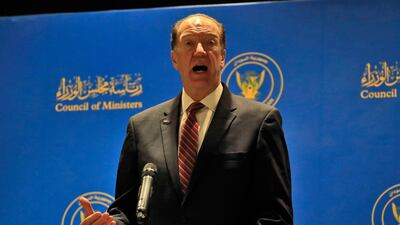The global food crisis is “severe” and is affecting poorer countries, World Bank president David Malpass said.
He called on countries to take urgent action to solve the food security challenge caused by geopolitical conflict.
“People in poor countries, especially in rural areas, are the hardest hit by the food crisis … there is also a tendency to move towards less nutritional food that is more concerning.”
“There has been a shortage of food, energy and fertilisers … fertilisers and energy are critical for the crop cycle, so they are building on each other and creating a food crisis that will last at least for months and probably into next year. Food prices are already up almost 37 per cent year-on-year,” Mr Malpass said during an online press conference.
For each one percentage point increase in food prices, 10 million people are thrown into extreme poverty, according to the World Bank's estimates.
The UN Food and Agriculture Organisation's food price index has warned of sharp price increases for grains, oils and other foodstuffs as exports from agricultural powerhouse Ukraine continue to be affected by conflict.
However, Mr Malpass said there is one “positive side” to this crisis.
“Markets have reacted quickly, and we are entering this food insecurity cycle with large global stockpiles … as they [food stockpiles] are released there can be progress and also the supply of food, fertilisers and energy can be increased substantially by countries if they choose to do so.”
“Countries should start early. The World Bank hopes that many countries will step forward with individual solutions to immediately alleviate the food and fertiliser crises,” Mr Malpass said.
On Monday, the World Bank cut its forecast for global growth to 3.2 per cent, from its earlier expectation of 4.1 per cent. The International Monetary Fund also lowered its projections for global growth to 3.6 per cent in 2022 and 2023, revising it down 0.8 and 0.2 percentage points from its January forecast.
Mr Malpass said developed economies can add substantially to the global supplies and ease some of the burden on the poorer countries. He also urged central banks to use the right tools to add to the supplies and ensure better capital allocation.
“They [developed economies] need to build up their systems to produce more … one of the drawbacks in recent years is the shortage of investments especially in the developing world.”
“There should be policies to boost investments … capital allocation of global resources can be improved to boost equality … poor countries are lagging further behind and some of that owes to macro policies of advanced economies. They are borrowing very heavily from global capital markets which leaves less for other countries,” Mr Malpass said.
Mr Malpass said that the world has “to move urgently towards solutions” as rising interest rates and debt burdens begin to pile pressure on developing countries.
He urged countries to put in place strong policies that will help them to attract investments from their own citizens and foreigners.
The World Bank is also preparing a $170 billion package in response to the global crises of Russia's war in Ukraine, the Covid-19 pandemic and inflation.
To help Ukraine, the World Bank mobilised nearly $1bn in emergency financing to continue government services and help to pay hospital workers and pensions. Last week, it announced another $1.5bn support for essential government services in Ukraine.
“On Thursday we have a meeting with Ukraine and supportive countries to look for further assistance for both near- and long-term needs of people.”
“We are pleased to see some refugees are going back to Ukraine as the situation in some parts stabilises … we are encouraged to see this trend but war still continues and there are millions of displaced people in Ukraine who need assistance,” Mr Malpass said.


